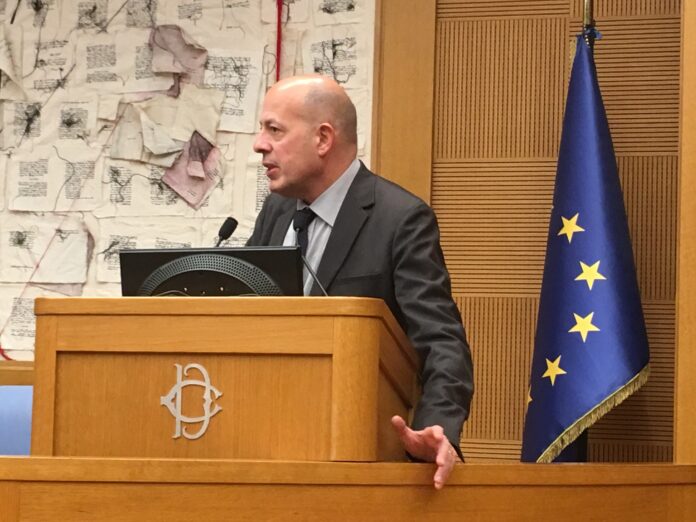Translated by Duncan Hanson / American Waldensian Society –
This is the first part of a longer interview with Luca Maria Negro, a longtime leader in the ecumenical movement, that was conducted shortly before the election of his successor as president of the Federation of Protestant Churches in Italy.
Let’s begin this interview by discussing Mediterranean Hope, the refugee and migrant ministry of the Federation of Protestant Churches in Italy. What were the high points and the low points for you in this important ministry?
In Lampedusa, I received two gifts: One was a beautiful plaque, given to me by those who work there. It was a gift that moved me profoundly. The other was the opportunity to go to the Favaloro Pier when a boat came in that was filled with refugees. In that moment, as I watched the migrants disembark, I saw with my own eyes the inhuman and dehumanizing situations through which they have come. The only good thing I saw as they disembarked was the welcome that they received from Mediterranean Hope’s volunteers and staff, who greeted each one with a smile.
When you come face to face refugees getting off a boat, it’s very different than seeing a television news report. Unfortunately, we have become used to see inhuman images on TV. Several times, I’ve also been present as refugees have arrived by air on flights arranged by Mediterranean Hope. Each time, I have been very much affected by what I experienced. However, it was a different experience than meeting people who are getting off a rescue boat. The people who are getting off a plane are usually smiling, and they are bringing their luggage with them. Obviously, that’s not the case with people who are disembarking from rescue boats. Nevertheless, there is a common denominator in both situations and that is that the people are arriving in Europe who have been able to escape from nearly impossible situations.
Welcoming these people as they were getting off an airplane or a boat has been a confirmation of all that we as a federation of churches have done to involve ourselves with migrants and refugees. I am not just speaking about what has happened in Lampedusa and with Humanitarian Corridors but also in the Casa delle Culture in Scicli on the island of Sicily, in Rosarno in Calabria in southern Italy, and even in Lebanon in the eastern Mediterranean and in Bihac in Bosnia. In every place, we have tried to put our faith into visible action at various borders. For me, that has been the high point of our work together these last many years. Since you also asked me what was the most difficult part of our work together, I would say it was the responsibility that everyone of us had for wellbeing and even for the survival of so many of our fellow human beings. It makes my hands shake to think of what we have had to do together to help so many desperate people.
During your tenure as president of the Federation of Protestant Churches in Italy you have often mentioned the importance of welcoming the stranger. Can you elaborate on what welcoming the stranger means to you?
In recent years I have often thought about the parable of the Good Samaritan in Luke 10:25-37. There is an aspect of that story, which is most evident in the original Greek New Testament, that is very close to my heart. When the Good Samaritan brings this beaten, hurt, and wounded man to the inn, the Greek word for inn is pandocheion, literally “a place that welcomes everyone.” This is what the church must be: A place that welcomes everyone.
There is another word in the original Greek New Testament that also means a lot to me. That word is philoxenia, which literally means “love for the xenos or stranger” or, as it is rendered in most English translations, “hospitality”. The Letter to the Hebrews says that, by practicing philoxenia or hospitality, some have hosted angels without knowing it. Giving hospitality to strangers brings a blessing. The antonym for philoxenia needs no translation. It is xenophobia, literally “hatred for foreigners”. The sin of Sodom mentioned in Genesis 18 is xenophobia, not homosexuality as some have assumed. In the context of these passages from Hebrews and Genesis, xenophobia is simply a failure to give hospitality to strangers. It is a failure that leads to death.
I think we would do well to look again at these biblical passages. Populists, xenophobes, those who incite hatred towards the stranger, have really put themselves at a crossroads: Are they going to change directions and take the way of blessing or are they going to continue on the way that leads to death.
This interview was conducted recently by NEV, the press agency of the Federation of Protestant Churches in Italy. Luca’s successor as president of the Federation of Protestant Churches is Daniele Garrone, an Old Testament scholar and professor at the Waldensian Theological Seminary.





























